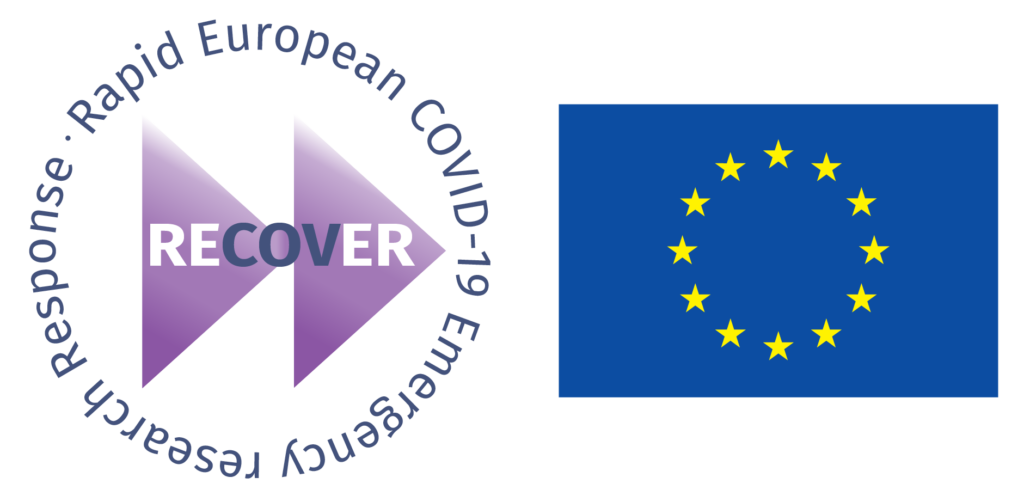News
Read about the latest developments in RECOVER
RECOVER studies continue in Ecraid
On the 1st of January 2022, the Ecraid foundation was formerly launched. Ecraid advances clinical research in the field of infectious disease with the development of a pan-European clinical research network. It is the first network of its kind in Europe. MERMAIDS, SOS-COVID and REMAP-CAP, the clinical studies that have been included as part of the HORIZON2020 funded RECOVER project on COVID-19 are embedded into Ecraid.
Social Science team investigates conditionality of COVID-19 vaccine acceptance in Europe
At the beginning of 2022, the SARS-CoV-2 pandemic has not stopped yet. Despite high vaccination coverage, the number of positive cases has reached a record level. In addition, a new SARS-CoV-2 variant has emerged (Omicron variant) with a higher infection rate compared to previous variants. Both of these aspects may have a significant effect on the transmission of SARS-CoV-2 within households. However, the extent of that effect has not yet been quantified. Therefore, a new study to analyse the transmission of SARS-CoV-2 infections within households was launched in January 2022.
Household study restarted: aim to enroll 100 households
At the beginning of 2022, the SARS-CoV-2 pandemic has not stopped yet. Despite high vaccination coverage, the number of positive cases has reached a record level. In addition, a new SARS-CoV-2 variant has emerged (Omicron variant) with a higher infection rate compared to previous variants. Both of these aspects may have a significant effect on the transmission of SARS-CoV-2 within households. However, the extent of that effect has not yet been quantified. Therefore, a new study to analyse the transmission of SARS-CoV-2 infections within households was launched in January 2022.
ISARIC published new COVID-19 Clinical Data Report
RECOVER’s partner ISARIC has recently published a report describing the clinical presentation, treatment and outcome of a cohort of over 700,000 patients with COVID-19, hospitalised between January 2020 and September 2021 in 64 countries throughout the world. This has been possible thanks to 1669 institutions and their clinical teams contributing to ISARIC.
PRESS RELEASE: A critical eye on European clinical research response during COVID-19 pandemic
Professor Herman Goossens (University of Antwerp and University Hospital of Antwerp), in collaboration with his colleagues Marc Bonten and Lennie Derde of the University Medical Centre Utrecht, and Peter Horby of the University of Oxford, casts a critical eye on how the clinical research community reacted to the pandemic in Europe in a new publication in The Lancet Infectious Diseases.
RECOVER promotes Ecraid educational webinar
The RECOVER project is proud to promote the Ecraid educational webinar “Clinical case discussion: How clinical trials inform antibiotic stewardship”, organized by ERS with the participation of ESCMID. The webinar will take place on 19 January, 2022 from 13:00–14:30 CET.
RECOVER supports activities linked to World AIDS Day
Today, RECOVER is supporting the activities linked to World AIDS Day with one of its vital partners, Penta. World AIDS Day is an opportunity for people around the world to unite in the fight against HIV, to show support for people living with HIV, and to commemorate those who have died from an AIDS-related illness. World AIDS Day was founded 33 years ago, in 1988.
Looking back at RECOVER’s results so far
RECOVER is one of the 18 projects that the European Union has founded in response to the COVID-19 pandemic. It brings together leading scientists and research institutions to obtain crucial unknown information about the disease through clinical research in order to help the EU fight the virus and save patients’ lives. Now, it is time to look back on the first period of RECOVER and what we have achieved so far.
New RECOVER study explores experiences of scientists in government advisory boards during COVID- 19
In order to tackle the pandemic, governments established various types of advisory boards to provide evidence and recommendations to policy makers. Scientists working on these boards have faced many challenges, including working under significant time constraints to produce ‘evidence’ as quickly as possible. However, their voices are still largely missing in the scientific literature. In a recent qualitative study, the RECOVER social science team explores the views and experiences of scientists working on government advisory boards during the COVID- 19 pandemic, with the aim to learn lessons for future pandemic management and preparedness.
PRESS RELEASE: ISARIC COVID-19 clinical database passes the half million patient records mark
On its 10th anniversary, University of Oxford’s ISARIC (International Severe Acute Respiratory and Emerging Infection Consortium) demonstrates the crucial role of global preparedness and collaboration for advancing knowledge on infectious disease pandemics.

